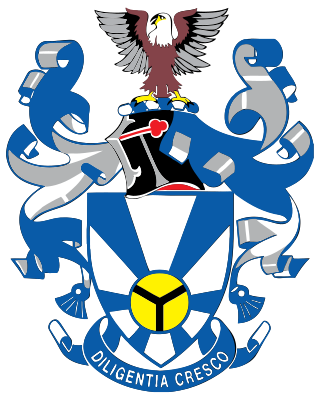Related Research Articles

Manchester Metropolitan University (MMU) is located in the centre of Manchester, England. The university has 40,000 students and over 4,000 members of staff. It is home to four faculties and is one of the largest universities in the UK, measured by the size of its student population in 2020/21.

The University of KwaZulu-Natal is a university with five campuses in the province of KwaZulu-Natal in South Africa. It was formed on 1 January 2004 after the merger between the University of Natal and the University of Durban-Westville.
Westville is an area in KwaZulu-Natal, South Africa, and is just west and 10 km inland from the Durban CBD. It was formerly and independent municipality and became part of the eThekwini Metropolitan Municipality in 2002.

Liverpool Hope University is a public university with campuses in Liverpool, England. The university grew out of three teacher training colleges: Saint Katharine's College, Notre Dame College, and Christ's College. Uniquely in European higher education, the university has an ecumenical tradition, with Saint Katharine's College having been Anglican and Notre Dame and Christ's College having both been Catholic. The Anglican Bishop of Liverpool David Sheppard and the Catholic Archbishop of Liverpool Derek Worlock played a prominent role in its formation. Its name derives from Hope Street, the road which connects the city's Anglican and Catholic cathedrals, where graduation ceremonies are alternately held.

The Durban University of Technology (DUT) is a multi-campus university situated in KwaZulu-Natal, South Africa. It was formed in 2002 following the merger of Technikon Natal and ML Sultan Technikon and it was initially known as the Durban Institute of Technology. It has five campuses in Durban, and another two in Pietermaritzburg. In 2022, approximately 31 991 students were enrolled to study at DUT. The university is one of five technical institutions on the African continent to offer Doctoral Degrees.

The University of Zululand or UniZulu is a comprehensive tertiary educational institution north of the uThukela River in KwaZulu-Natal, South Africa. The university has established partnerships with schools in the United States and Europe such as the University of Mississippi, Radford University, Florida Agricultural and Mechanical University and Chicago State University. UniZulu was founded with the help of the Prince of Phindangene, Mangosuthu Buthelezi, who was also chancellor of the institution when it was established.

The University of Natal was a university in the former South African province Natal which later became KwaZulu-Natal. The University of Natal no longer exists as a distinct legal entity, as it was incorporated into the University of KwaZulu-Natal on 1 January 2004. It was founded in 1910 as the Natal University College in Pietermaritzburg and expanded to include a campus in Durban in 1931. In 1947, the university opened a medical school for non-white students in Durban. The Pietermaritzburg campus was known for its agricultural engineering programmes, hence the nickname "the farmers" whilst the Durban campus was known as "the engineers," as it concentrated on other engineering programmes.

Indian South Africans are South Africans who descend from indentured labourers and free migrants who arrived from British India during the late 1800s and early 1900s. The majority live in and around the city of Durban, making it one of the largest ethnically Indian-populated cities outside of India.

Transvaal University College was a multi-campus public research university in South Africa which gave rise to the University of the Witwatersrand and the University of Pretoria.

The University of South Africa (UNISA) is the largest university system in South Africa by enrollment. It attracts a third of all higher education students in South Africa. Through various colleges and affiliates, UNISA has over 400,000 students, including international students from 130 countries worldwide, making it one of the world's mega universities and the only such university in Africa.

Adam Mahomed Habib is a South African academic administrator serving as Director of the School of Oriental and African Studies, University of London since 1 January 2021. He served as Vice-Chancellor and Principal of the University of the Witwatersrand (Wits) in Johannesburg, South Africa, between 1 June 2013, when the term of his predecessor Loyiso Nongxa ended, and 1 January 2021. He is also a former deputy vice-chancellor of the University of Johannesburg.

Professor Cheryl Merle de la Rey is a South African academic who, since 2019, has been vice-chancellor of University of Canterbury in New Zealand. She was formerly Vice-Chancellor of the University of Pretoria in South Africa.
Professor Nigel Peter Weatherill, BSc, PhD, DSc, FIMA, C.Math, FRAeS, C.Eng, C.Sci, FREng, FRSA, DL is the former Vice-Chancellor and Chief Executive of Liverpool John Moores University (2011-2018).
Rolf Heinrich Stumpf was a South African statistician who served as Vice Chancellor and Rector of the Nelson Mandela Metropolitan University in Port Elizabeth. He was a member of the Academy of Science of South Africa and served on the Council of the University of South Africa.
Zwakele Maxwell Mncwango is a South African politician who is the provincial chairperson of ActionSA in KwaZulu-Natal. He was a Member of the KwaZulu-Natal Legislature from 2018 to 2022 and served as the Leader of the Opposition in the KwaZulu-Natal Legislature from 2018 to 2019. He was the Provincial Leader of the KwaZulu-Natal Democratic Alliance (DA) from 2015 to 2021. Mncwango was the party's KwaZulu-Natal Premier candidate for the 2019 election.
Ravigasen Ranganathan "Ravi" Pillay is a South African attorney and African National Congress (ANC) politician who served as the Member of the Executive Council for Economic Development, Tourism and Environmental Affairs in the KwaZulu-Natal Provincial Government from November 2020 until August 2022. He was the MEC for Finance from May 2019 to November 2020 and the MEC for Human Settlements and Public Works from 2011 to 2019. Pillay was elected to the KwaZulu-Natal Legislature in 2009 and served as the legislature's chief whip of the majority party from 2009 to 2011.
Jerry Pillay is the current General Secretary of the World Council of Churches. He is a Reformed pastor, member of the Uniting Presbyterian Church in Southern Africa, former professor of theology at the University of Pretoria where he heads the Department of History and Ecclesiology and was Dean of the Faculty of Theology and Religion. He was elected president of the World Communion of Reformed Churches (WCRC) in 2010 and, in June 2022, General Secretary of the World Council of Churches (WCC), to take office on 1 January 2023.
Viness Pillay FAAS (1970–2020) was a South African professor of pharmacy at the University of the Witwatersrand in Johannesburg. He was the Director of the Wits Advanced Drug Delivery Platform (WADDP), a member of African Academy of Sciences, Academy of Translational Medicine Professionals (ATMP) and a beneficiary of the 2013 Olusegun Obasanjo Innovative Award for developing the RapiDiss Wafer Technology as an innovative way to provide effective anti-retroviral (ARV) drug therapy to children afflicted with HIV/AIDS.

Francesco PetruccioneAAS,ASSAf, NITheCS is a physicist and academic leader currently living in South Africa and serving as a professor of Physics at Stellenbosch University and the director of the National Institute for Theoretical and Computational Sciences (NITheCS). With a wealth of experience in his field, he previously held the position of professor and Pro Vice-Chancellor of Big Data and Informatics at the University of KwaZulu-Natal (UKZN). Petruccione is also a member of the Academy of Science of South Africa and a Fellow of the Royal Society of South Africa.
Pragasen Pillay is a South African electrical engineer known for his research in power engineering and renewable energy technology. He has been a professor at Concordia University since 2008. Before that, he was a professor at Clarkson University from 1995 to 2007. He was appointed as an honorary professor at the University of Cape Town in 2017.
References
- 1 2 3 "Hope Honors International Partner With Honorary Degree". 4 April 2013. Retrieved 15 December 2022.
- ↑ "Share Your Thoughts on the Future of Hope". April 2022. Retrieved 15 December 2022.
- ↑ "Liverpool Hope University announces new Vice-Chancellor and Rector". 26 October 2022. Retrieved 15 December 2022.
- ↑ Renshaw, Rosalind (3 June 2008). "Working Relationship: Professor Gerald Pillay..." The Times . London. Archived from the original on 11 June 2011. Retrieved 6 July 2010.
- ↑ Ward, David (29 January 2008). "Interview: Gerald Pillay". The Guardian. Retrieved 14 June 2021.
- 1 2 "Pillay, Prof. Gerald John, (born 21 Dec. 1953), DL; DTheol, PhD; Vice-Chancellor and Rector, Liverpool Hope University, since 2005 (Rector and Chief Executive, Liverpool Hope University College, 2003–05)". Who's Who 2020 . Oxford University Press. 1 December 2019. Retrieved 14 June 2021.
- ↑ "Gerald Pillay Announced as New President". iofc.org/. 28 September 2021. Retrieved 5 September 2022.
- ↑ "Hope bids farewell to Vice-Chancellor, Professor Pillay". Liverpool Hope University . 16 December 2022.
- ↑ "Liverpool Hope University".
- ↑ "No. 63377". The London Gazette (Supplement). 12 June 2021. p. B13.